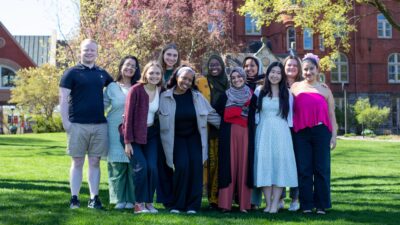
By Alexandra McLaughlin ’16 | Photo by John Schoolmeesters
Anthropology students work to enrich a fossil collection at the Science Museum of Minnesota
“This course will have a lasting impact on communities outside of Macalester.”—Anna Runquist ’25
Raised in St. Paul, Anna Runquist ’25 has visited the Science Museum of Minnesota dozens of times. Now—through a Macalester course called Human Evolution—she is creating material that the museum will distribute for years to come.
The museum’s lending library offers skull and stone tool casts for middle and high school teachers to use in the classroom. The collection includes famous fossil casts, such as representatives of 3.5 million-year-old Australopithecines from eastern and southern Africa, and stone tool casts from a major tool tradition in human evolution.
To make the collection more accessible and useful for teachers, Runquist and her classmates produced two-page handouts, designed for a general audience, with background information on the fossils.
“The idea that my work will go towards helping others learn more about anthropology and bring more people into the field is incredible,” said Runquist. “This course will have a lasting impact on communities outside of Macalester.”
The course, taught by Professor Scott Legge, looks at the big picture of human evolution. “We walk through the last 65 million years and examine key fossil discoveries,” he said.
A question Dr. Legge sometimes hears—What is the utility of studying fossils?
“Our understanding of what it means to be human and our evolutionary history is always changing,” he said. “Although we’re looking at fossils—the pun is terrible—it’s not set in stone. We’re always learning more. The background from this class will allow students to evaluate new finds and reassess how we see ourselves in the evolutionary history of the planet itself.”
The dynamic nature of anthropology drew Runquist to the field. “Anthropologists are always looking for answers and connections,” she said. “For a field that deals a lot with the past, it’s still very much centered in the future.”
New fossil discoveries happen all the time, Prof. Legge pointed out. “In August, a paper was published about a new biped—an upright walking hominin—from seven million years ago in Central Africa. That’s huge.”
Prof. Legge incorporates new research into coursework to help students stay up-to-date on the field. Macalester’s proximity to the Science Museum also provides an advantage. Students can access materials, expertise, internships, and career connections.
Partnering with the museum allows students to disseminate knowledge learned in the classroom to a broader audience, Dr. Legge noted. “Sharing that information with others helps us all better understand what it means to be human.”
The work resonated so deeply with Runquist, she declared an anthropology major this fall.
“Taking Human Evolution cemented the idea of becoming a biological anthropologist,” she said. “It’s the class I look forward to the most each day.”
February 1 2023
Back to top




